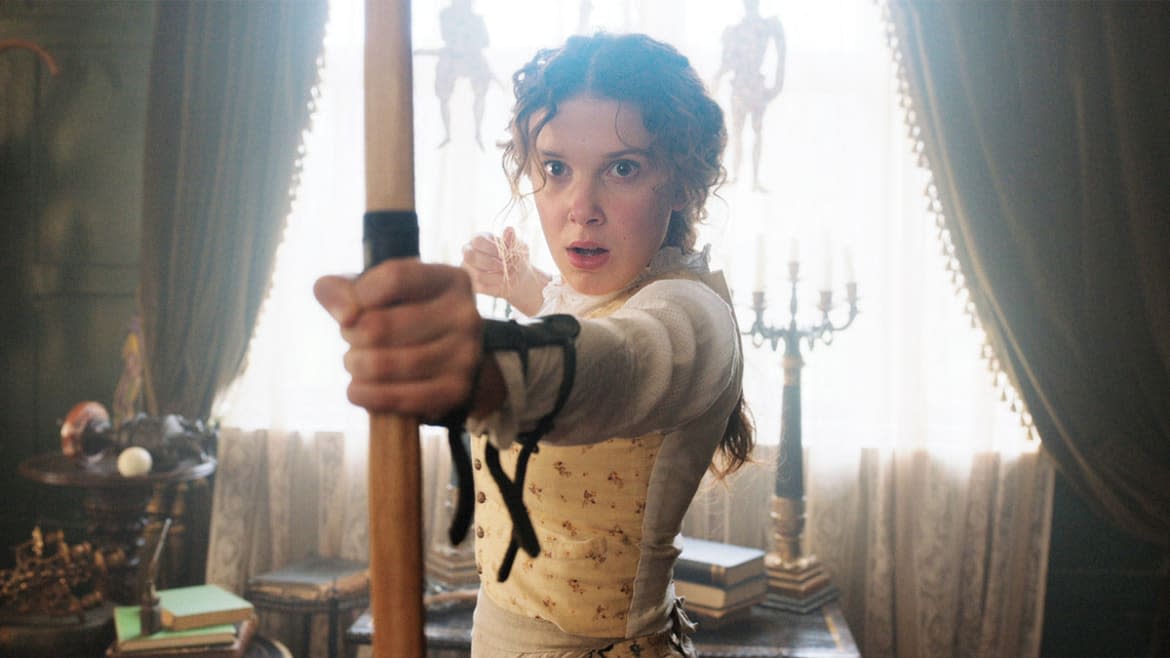‘Enola Holmes’ Shows There’s Way More to Millie Bobby Brown Than ‘Stranger Things’

Netflix’s new mystery movie, Enola Holmes, showcases the full breadth of Millie Bobby Brown’s talents with one of the entertainment industry’s time-honored traditions: letting her do battle against the lung-crushing oppression of a corset.
From the moment Brown crushed a Coke can with her brain as Eleven in Stranger Things, it was obvious she was going places. But the young actress’s fascinating potential could only be revealed with time and a proper starring role. (And her feature debut, a supporting role in Godzilla: King of the Monsters, did not quite meet that mark.)
Enter Enola Holmes, a delightful adventure that premiered on Netflix Wednesday. The film’s stunning cast includes Henry Cavill as Enola’s famous older brother Sherlock Holmes, Helena Bonham Carter as her mother, and Fiona Shaw as an overbearing finishing school headmistress—alongside many others. And while both the film and the book series upon which it is based derive their inspiration from the legendary Arthur Conan Doyle detective, Enola Holmes scoffs at its title character’s famous big bro with the winning dismissiveness of little sisters everywhere.
The caper at hand is straightforward enough. When eccentric Holmes matriarch Eudoria (Bonham Carter) suddenly disappears, poor Enola falls into the care of her misogynistic, reputation-obsessed older brother Mycroft—who vows to ship her off to finishing school where she will undoubtedly be stuffed into whale-bone and forced to balance books atop her head. And so, our heroine runs away to find her mother—and stumbles upon another mystery (and companion) along the way, helping her realize her future as a detective in her own right.
Plenty of films have gathered equally accomplished casts and failed—but Enola Holmes is too clever to stumble into any of the pitfalls that have bedeviled its predecessors. Each actor finds just the right humorous inflection, and more broadly every level of the production seems to understand exactly what the film is doing. From the performances, to Enola’s never-ending closet of disguises, to the charmingly dilapidated estate she calls home, this film embraces the outlandish.
Bonham Carter plays Eudoria as a devout, if somewhat unhinged, feminist who trains her daughter in the arts of fighting, chess, and explosions while also making sure she reads the classics. Cavill, meanwhile, brings an unassuming charm to Sherlock—imbuing him with bemused black-sheep energy and an indulgent warmth toward his little sister. And Brown seizes her starring turn for all it’s worth—narrating with humor and pluck as Enola outsmarts everyone around her.
As Eleven, Brown has served as the emotional anchor for Stranger Things throughout its run. Over three seasons she has unraveled her mysterious and initially closed-off character into a delightfully normal (well, OK, kind of normal) tweenage girl—with all the crushes, insecurities, and temper tantrums that entails. But Eleven’s taciturn nature has become visibly limiting as Brown grows into her raw talent—even as the character has slowly honed her speech skills.
By shimmying into Enola’s Victorian era garb, Brown sheds those constraints and embraces her chattier side. After three years playing a recovering telekinetic trauma survivor, it’s... kind of refreshing to watch Brown simply play a teenage girl! Yes, Enola’s preternatural abilities and problems are kind of unique—but there’s something wonderfully familiar about the youthful crush that develops on her runaway travel buddy, the puppyish flower aficionado Viscount Tewksbury, Marquess of Basilwether. (Which Enola understandably truncates to “Tewksbury.”) Their timid flirtations certainly feel more believable than the committed relationships the tweens of Stranger Things have embraced.
And that, perhaps, is actually the greatest strength of Enola Holmes: It meets its spunky heroine at her level. At times, the film can lean a little too hard on its fourth-wall breaks, and its understanding of female empowerment is undeniably reductive. But overall it feels perfectly calibrated to its central character’s wavelength—which Brown drives home with specificity and attitude. And right now especially, we could do worse than a film that encourages young women to follow their own path—others’ opinions be damned.
Get our top stories in your inbox every day. Sign up now!
Daily Beast Membership: Beast Inside goes deeper on the stories that matter to you. Learn more.


